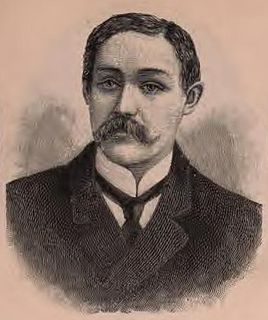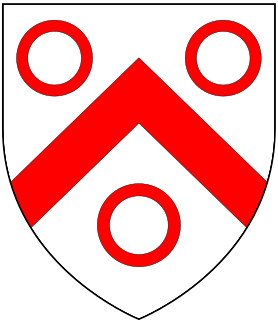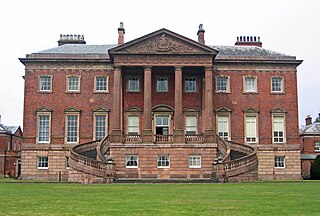Related Research Articles

Viscount Hill, of Hawkstone and of Hardwicke in the County of Salop, is a title in the Peerage of the United Kingdom. It was created in 1842 for General Rowland Hill. He had already been created Baron Hill, of Almaraz and of Hawkstone in the County of Salop, in 1814, with remainder to the heirs male of his body, and Baron Hill, of Almarez and of Hawkestone and Hardwicke in the County of Salop, in 1816, with remainder to the heirs male of his elder brother John Hill. The viscountcy was created with the same special remainder. On the first Viscount's death in 1842, the barony of 1814 became extinct as he had no male issue, while he was succeeded in the barony of 1816 and the Viscountcy according to the special remainders by his nephew Sir Rowland Hill, 4th Baronet. His son, the 3rd Viscount, sat as a Conservative Member of Parliament for Shropshire North. In 1875, he assumed by Royal licence the additional surname of Clegg, which was that of his maternal grandfather. He inherited financial problems from his father which led to the breakup and sale of the family estates.

Baron Hotham, of South Dalton in the County of York, is a title in the Peerage of Ireland. It was created in 1797 for the naval commander Admiral William Hotham, with remainder to the heirs male of his father. Hotham was the third son of Sir Beaumont Hotham, 7th Baronet, of Scorborough, and in 1811 he also succeeded his nephew as eleventh Baronet. Lord Hotham never married and on his death in 1813 he was succeeded in both titles by his younger brother Beaumont, the second Baron and twelfth Baronet. He had previously represented Wigan in the House of Commons.

Baron Roborough, of Maristow in the County of Devon, is a title in the Peerage of the United Kingdom. It was created on 24 January 1938 for Sir Henry Lopes, 4th Baronet. He had earlier represented Grantham, Lincolnshire, in Parliament as a Conservative. The Baronetcy, of Maristow House in the County of Devon, had been created in the Baronetage of the United Kingdom on 1 November 1805 for Manasseh Masseh Lopes, a member of a wealthy family of Portuguese origin, with special remainder to his nephew Ralph Franco, son of his sister Maria. Manasseh Masseh Lopes converted to Christianity in 1802, and later represented Evesham, in Worcestershire, Barnstaple in Devon, and Westbury in Somerset, in Parliament. However, in 1819 he was twice convicted of bribing the voters in both Barnstaple and Grampound in order to be elected to Parliament, and was sentenced to imprisonment and heavy fines. He was also unseated by the House of Commons, but after his release from prison he nonetheless got elected for Westbury, a pocket borough which he controlled to a great extent.

There have been three baronetcies created for people with the surname Hood, one in the Baronetage of Great Britain and two in the Baronetage of the United Kingdom. The first Baronet of the first creation was made Viscount Hood, while the fourth Baronet of the second creation was made Baron St Audries.

There have been two baronetcies created for members of the Trevelyan family, one in the Baronetage of England and one in the Baronetage of the United Kingdom. As of 2014, both creations are extant.
Massey Henry Edgcumbe Lopes, 2nd Baron Roborough, JP of Maristow in the parish of Tamerton Foliot, Devon, was a British peer and officer of the British Army.

Henry Yarde Buller Lopes, 1st Baron Roborough, known as Sir Henry Lopes, 4th Baronet from 1908 to 1938, of Maristow in the parish of Tamerton Foliot, Devon, was a British Conservative Party politician.

There has been one creation of a baronetcy with the surname Dering.

The Barttelot Baronetcy, of Stopham in the County of West Sussex, is a title in the Baronetage of the United Kingdom.

There have been four baronetcies created for members of the Wills family, owners of W. D. & H. O. Wills and major shareholders and directors of the Imperial Tobacco Company. All four creations were in the Baronetage of the United Kingdom.

The Wood, later Page Wood Baronetcy, of Hatherley House in the County of Gloucester, is a title in the Baronetage of the United Kingdom. It was created on 16 December 1837 for Matthew Wood, Lord Mayor of London from 1815 to 1817 and Whig Member of Parliament for the City of London from 1817 to 1843. The fifth Baronet assumed the additional surname of Page. Two other members of the family have also gained distinction. William Wood, 1st Baron Hatherley, Lord High Chancellor of Great Britain from 1868 to 1872, was the second son of the first Baronet while Field Marshal Sir Evelyn Wood was the fifth son of the second Baronet. Also, Katharine O'Shea, known for her relationship with Charles Stewart Parnell, was the daughter of the second Baronet. The theosophist and political activist Annie Besant, was the great-granddaughter of the 1st Baronet's father.

Sir Lopes Massey Lopes, 3rd Baronet, PC, known as Massey Franco until 1831, of Maristow in the parish of Tamerton Foliot, Devon, was a British Conservative politician and agriculturalist.

The Wake Baronetcy, of Clevedon in the County of Somerset, is a title in the Baronetage of England. It was created on 5 December 1621 for Baldwin Wake. The sixth Baronet assumed the additional surname of Jones but died childless. The eighth Baronet sat as Member of Parliament for Bedford. The twelfth Baronet was High Sheriff of Northamptonshire in 1879. The thirteenth Baronet was a Major-General in the British Army. Another member of the family to gain distinction was Charles Wake, second son of the tenth Baronet; he was an Admiral in the Royal Navy.

There have been two baronetcies created for persons with the surname Goring, both in the Baronetage of England. The second creation came into the family through a special remainder in the patent creating the baronetcy. Only the latter creation is extant as of 2008.

The Dyke Baronetcy, of Horeham in the County of Sussex, is a title in the Baronetage of England. It was created on 3 March 1677 for Thomas Dyke, Commissioner of Public Accounts and Member of Parliament for Sussex and East Grinstead. The 2nd Baronet married Anne Hart, daughter and heiress of Percival Hart. In 1836 the 5th Baronet unsuccessfully claimed the barony of Braye, of which peerage he was a co-heir through the Hart family. The 7th Baronet was a successful Conservative politician. Percyvall Hart Dyke (1872–1952), grandson of Reverend Thomas Hart Dyke, second son of the 5th Baronet, was a Colonel in the Indian Army. His son Trevor Hart Dyke was a Brigadier in the Queen's Royal Regiment. David Hart Dyke, son of Reverend Eric Hart Dyke, son of the aforementioned Colonel Percyvall Hart Dyke, is a retired Captain in the Royal Navy and commanded HMS Coventry during the Falklands War. His daughter Miranda Hart is a well known writer, comedian, and actress.

Sir Robert Bacon, 3rd Baronet of Redgrave (1574–1655) was an English politician.

Sir Edmund Bacon, 6th Baronet, of Garboldisham, Norfolk, was a British politician who sat in the House of Commons between 1710 and 1741.

The Wilson, later Maryon-Wilson Baronetcy, of East Borne in the County of Sussex, was a title in the Baronetage of England. It was created on 4 March 1661 for William Wilson, of East Borne Place in the parish of Eastbourne, Sussex, a descendant of Sir Thomas Wilson (1524-1581), Knight, Secretary of State to Queen Elizabeth I. The sixth Baronet sat as Member of Parliament for Sussex. The eleventh Baronet assumed the additional surname of Maryon in 1899. The title became extinct on the death of the thirteenth Baronet in 1978.

There have been two baronetcies created for persons with the surname Leicester, both in the Baronetage of England. The fifth Baronet of the second creation was raised to the peerage as Baron de Tabley in 1826. Both the barony and the two baronetcies are now extinct.

Captain Sir Alexander Fuller-Acland-Hood, 3rd Baronet also known as Alexander Hood, 3rd Baronet, was an English Conservative Party politician, landowner and farmer.
References
- Kidd, Charles, Williamson, David (editors). Debrett's Peerage and Baronetage (1990 edition). New York: St Martin's Press, 1990, [ page needed ]
- Leigh Rayment's list of baronets